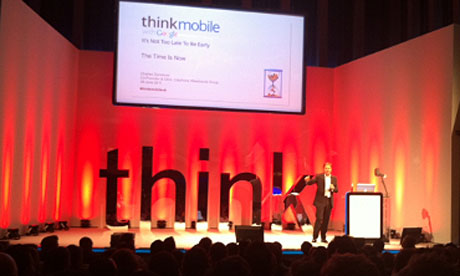
The Ogilvy vice president, Rory Sutherland, and the Carphone Warehouse chief executive, Charles Dunstone, bagged the keynote slots at Google's Think Mobile conference in London, outlining contrasting views of mobile technology and the industry around it.
Sutherland kicked off, with a talk on the science of human behaviour. "Our adoption of technology has actually leapt ahead of our understanding of people's understanding of it, their use of it, and how they actually react to it," he said.
"Over the next few years I think we're going to see something of a slowdown in technological progress ... relative incremental improvement, but relative stability."
Less about huge leap forwards in what technology can do, and more about establishing what that means, and how we will be using it.
Sutherland addressed the comparative merits of television and mobile for advertising: TV is still better for emotional engagement, but mobile is a different kettle of fish.
"The comparative advantage of mobile is interesting to discuss ... it's about context, it's about timeliness, it's about the ability to actually engage people in extraordinarily sophisticated dialogue, customisation, feedback, customer service," he said.
"In many ways its comparative advantage may be closer to what we think of as customer service than to what we think of as advertising."
Sutherland also talked about "target moments" and "target context" on mobile — an area where mobile enjoys an "extraordinary comparative advantage" over other media.
Dunstone followed with his own take, suggesting it's important to look at the history of mobile when trying to get to grips with what's happening now.
"All the way through mobile, people have failed to understand its potential, and then failed to capitalise on its potential," he said. "It's quite an odd business to work in. Generally what happens in the mobile business is not what anyone has ever anticipated."
The obvious example: text messaging, famously invented as a way for operators to communicate with their customers about network outages and other issues. And then picture messaging, which was expected to boom but didn't.
"Everything the mobile phone industry has invented thinking customers would like it has been a failure, and everything that has been a success has occurred through an accident," said Dunstone. "The business model has succeeded in spite of the incompetence of the people within."
Dunstone talked about the transformation of the mobile market in the last three to four years, where "the incumbents in the marketplace have squandered the opportunity" to such an extent that the key players are now the companies with operating systems, rather than the companies who run networks or make hardware.
He pointed to Apple, Google and Research In Motion – still a powerful brand for UK teenagers – and potentially Microsoft.
"They're now the people that are driving the marketplace, and it's a sad reflection of everyone else in the mobile industry that it's taken these new entrants to come in and give the existing companies a masterclass in how to sell mobile data."
What about the future? Dunstone said Carphone Warehouse is focused on three trends.
"Users of smartphones are not just users of smartphones: they're bigger users of every form of communication," he said. "These are highly connected people," he said.
The second trend: how to use mobile as a payment mechanism. "The next prize is also who can consolidate some kind of one-click," he said. "Apple are clearly succeeding, Amazon are succeeding, but beyond that it's hard to think of people, and that's an enormous prize."
Third: using mobile as an m-commerce channel.
"People tend to be using their mobile phone or tablet while doing something else," he said: watching TV, lying in bed or out shopping. "You get very, very targeted responses from people. They're not surfing or browsing: they're somewhere and they want to find the Nando's restaurant, or whatever it may be."
Dunstone said there is also currently much less competition in paid-for search on mobile than online. Carphone is running a trial with Google where users can search for a product, and find out how many of them are in stock in a nearby store.
"Hopefully that can help us win the battle over the O2 shop, the Apple shop or whoever we're dealing with," he said.
Dunstone also said that a small trend: people mis-spell much more often when searching for things on their mobile phones — something for mobile website owners to be aware of.
"There's no silver bullet: no one who can tell you exactly what's going to happen in this space," he said. "You will succeed by experimentation, and generally fortune will favour the brave. If you go for it and engage in the marketplace ... the more you push, the more surprised you will be about what you can get out of it."

